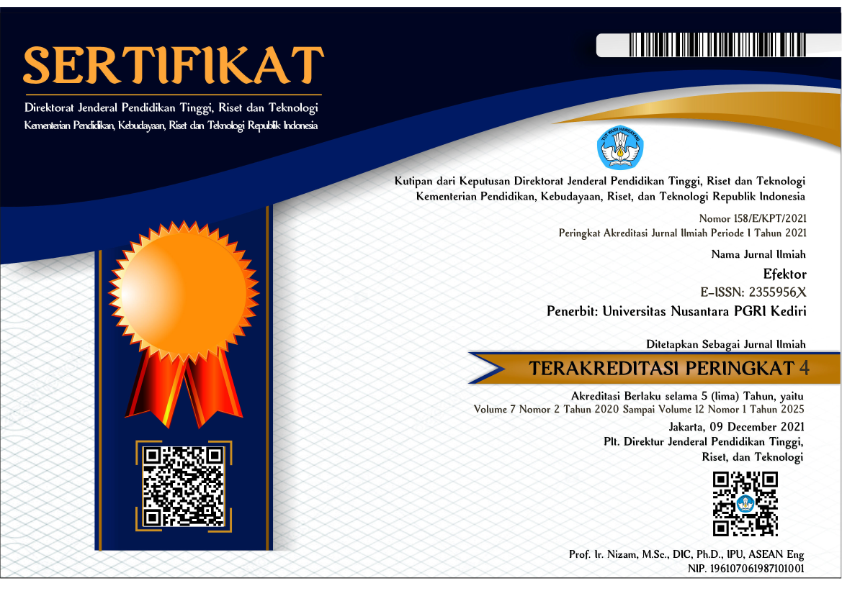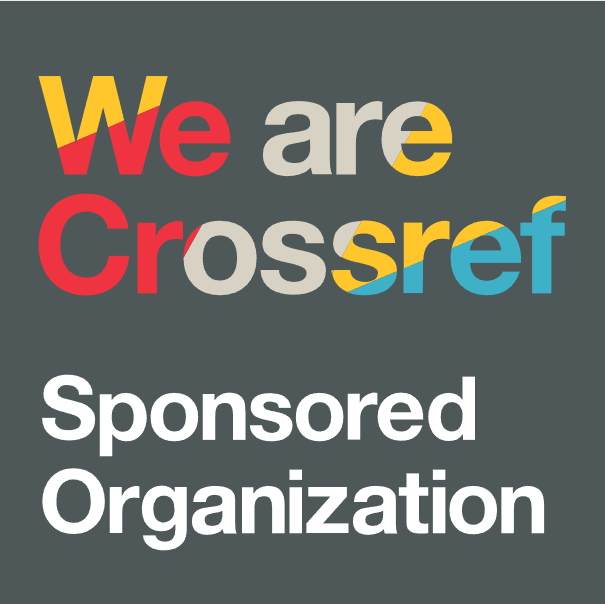Peran Grit sebagai Moderator Hubungan Antara Ketidakamanan Kerja Dan Kepuasan Kerja Pada Karyawan Terdampak Kebijakan Covid-19Indonesia
DOI:
https://doi.org/10.29407/e.v9i1.17084Keywords:
grit, job insecurity, job satisfactionAbstract
Covid-19 has brought changes in various aspects of life, including on companies and their employees. Company implements several policies as an effort to adapt with changes. This study aims to examine the role of grit as the moderator in the relationship between job insecurity and job satisfaction on employees. The approach of this research is by quantitative with cross sectional study design, conducted by distributing online questionnaires using non-probability sampling technique. The measurement tools used, namely The Minesota Satisfaction Questionnaire (MSQ) short-form, Multidimensional Qualitative Job Insecurity Scale (MQJIS), and short grit scale (Grit-S). The population of this research is employees whose company implemented policy changes due to the Covid-19. Data analysis was carried out by correlation test and moderation test using PROCESS Hayes Model 1, with the amount of data analyzed were 748 participants. The results show significant interaction effect between job insecurity and grit on job satisfaction (b = -0.02, 95% CI [-0.04, -0.01], t=-3.09, p<0.05 ). With that, it can be concluded that grit acts as moderator in the relationship between job insecurity and job satisfaction. Further analysis found grit can attenuate negative effect of job insecurity on job satisfaction when grit is in the medium and high category.
References
Achiel, Y., Soffy, B., Eka, A. A., & Kumaya, J. R. (2020). DAMPAK PANDEMI COVID-19 BAGI PEKERJA “ PHK , PEMOTONGAN GAJI , DAN Pendahuluan. … (Psikologi Wijaya Putra), 1(2), 1–10. http://jurnal.uwp.ac.id/fpsi/index.php/psikowipa/article/view/34
Atmoko, I. D., Sumastuti, E., & Violinda, Q. (2020). Analisis Penyebab Kecemasan di PHK pada Buruh Pabrik saat Pandemic Covid-19. Universitas Islam Sultan Agung, 1095–1120.
Bakker, A. B., & Demerouti, E. (2007). The Job Demands-Resources model: State of the art. Journal of Managerial Psychology, 22(3), 309–328. https://doi.org/10.1108/02683940710733115
Bakker, A. B., & Demerouti, E. (2017). Job demands–resources theory: taking stock and looking forward. Journal of occupational health psychology, 22(3), 273.
Brondino, M., Bazzoli, A., Vander Elst, T., De Witte, H., & Pasini, M. (2020). Validation and measurement invariance of the multidimensional qualitative job insecurity scale. Quality and Quantity, 54(3), 925–942. https://doi.org/10.1007/s11135-020-00966-y
Cahya, A. D., Astuti, R. D., & Palupi, D. (2021). Analisis Beban Kerja Dan Lingkungan Kerja Terhadap Kepuasan Kerja Karyawan Masa Pandemi Covid-19. Jurnal Ilmu Manajemen, 10, 87–93.
Cheng, G. H. L., & Chan, D. K. S. (2008). Who suffers more from job insecurity? A meta-analytic review. Applied Psychology, 57(2), 272–303. https://doi.org/10.1111/j.1464-0597.2007.00312.x
Credé, M., Tynan, M. C., & Harms, P. D. (2017). Much ado about grit: A meta-analytic synthesis of the grit literature. Journal of Personality and Social Psychology, 113(3), 492–511. https://doi.org/10.1037/pspp0000102
Duckworth, A. L., Peterson, C., Matthews, M. D., & Kelly, D. R. (2007). Grit: Perseverance and Passion for Long-Term Goals. Journal of Personality and Social Psychology, 92(6), 1087–1101. https://doi.org/10.1037/0022-3514.92.6.1087
Dugan, R., Hochstein, B., Rouziou, M., & Britton, B. (2019). Gritting their teeth to close the sale: the positive effect of salesperson grit on job satisfaction and performance. Journal of Personal Selling and Sales Management, 39(1), 81–101. https://doi.org/10.1080/08853134.2018.1489726
Eskreis-Winkler, L., Shulman, E. P., Beal, S. A., & Duckworth, A. L. (2014). The grit effect: Predicting retention in the military, the workplace, school and marriage. Frontiers in Psychology, 5(FEB), 1–12. https://doi.org/10.3389/fpsyg.2014.00036
Fernandes, N. (2020). Economic effects of coronavirus outbreak (COVID-19) on the world economy. IESE Business School Working Paper No. WP-1240-E. http://dx.doi.org/10.2139/ssrn.3557504
Gasparro, R., Scandurra, C., Maldonato, N. M., Dolce, P., Bochicchio, V., Valletta, A., ... & Marenzi, G. (2020). Perceived job insecurity and depressive symptoms among Italian dentists: The moderating role of fear of COVID-19. International journal of environmental research and public health, 17(15), 5338.
Goh, Z., Ilies, R., & Wilson, K. S. (2015). Supportive supervisors improve employees’ daily lives: The role supervisors play in the impact of daily workload on life satisfaction via work-family conflict. Journal of Vocational Behavior, 89, 65–73. https://doi.org/10.1016/j.jvb.2015.04.009
Green, F. (2020). Health effects of job insecurity. IZA World of Labor, December 2015, 1–11. https://doi.org/10.15185/izawol.212.v2
Greenhalgh, L., & Rosenblatt, Z. (1984). Job Insecurity: Toward Conceptual Clarity. Academy of Management Review, 9(3), 438–448. https://doi.org/10.5465/amr.1984.4279673
Hayes, A. F. (2017). Introduction to mediation, moderation, and conditional process analysis: A regression-based approach. Guilford publications.
Hellgren, J., Sverke, M., & Isaksson, K. (1999). A Two-dimensional Approach to Job Insecurity: Consequences for Employee Attitudes and Well-being. European Journal of Work and Organizational Psychology, 8(2), 179–195. https://doi.org/10.1080/135943299398311
Hunjra, A. I., Chani, M. I., Aslam, S., & Azam, M. (2010). Factors Effecting Job Satisfaction of Employees in Pakistani Banking Sector. African Journal of Business Management, 4(10), 2157–2163.
Jiang, L., & Lavaysse, L. M. (2018). Cognitive and Affective Job Insecurity: A Meta-Analysis and a Primary Study. Journal of Management, 44(6), 2307–2342. https://doi.org/10.1177/0149206318773853
Jin, B., & Kim, J. (2017). Grit, basic needs satisfaction, and subjective well-being. Journal of Individual Differences, 38(1), 29–35. https://doi.org/10.1027/1614-0001/a000219
Kayaalp, A., Page, K. J., & Gumus, O. (2021). Job satisfaction and transformational leadership as the antecedents of OCB role definitions: The moderating role of justice perceptions. International Journal of Business Science and Applied Management, 16(2), 89–101.
Kinnunen, U., Mäkikangas, A., Mauno, S., De Cuyper, N., & De Witte, H. (2014). Development of perceived job insecurity across two years: Associations with antecedents and employee outcomes. Journal of Occupational Health Psychology, 19(2), 243–258. https://doi.org/10.1037/a0035835
Kumar, R. (2011). h c r a Rese ology d o h Met a Rese ology d t.
Littman-Ovadia, H., & Lavy, S. (2016). Going the Extra Mile: Perseverance as a Key Character Strength at Work. Journal of Career Assessment, 24(2), 240–252. https://doi.org/10.1177/1069072715580322
McGinley, S., Line, N. D., Wei, W., & Peyton, T. (2020). Studying the effects of future-oriented factors and turnover when threatened. International Journal of Contemporary Hospitality Management, 32(8), 2737–2755. https://doi.org/10.1108/IJCHM-12-2019-1002
McGinley, S., & Mattila, A. S. (2020). Overcoming Job Insecurity: Examining Grit as a Predictor. Cornell Hospitality Quarterly, 61(2), 199–212. https://doi.org/10.1177/1938965519877805
Naiyananont, P., & Smuthranond, T. (2017). Relationships between ethical climate, political behavior, ethical leadership, and job satisfaction of operational officers in a wholesale company, Bangkok Metropolitan region. Kasetsart Journal of Social Sciences, 38(3), 345–351. https://doi.org/10.1016/j.kjss.2016.07.005
Nemteanu, M. S., Dinu, V., & Dabija, D. C. (2021). Job insecurity, job instability, and job satisfaction in the context of the COVID-19 pandemic. Journal of Competitiveness, 13(2), 65–82. https://doi.org/10.7441/JOC.2021.02.04
Ouyang, Z., Sang, J., Li, P., & Peng, J. (2015). Organizational justice and job insecurity as mediators of the effect of emotional intelligence on job satisfaction: A study from China. Personality and Individual Differences, 76, 147–152. https://doi.org/10.1016/j.paid.2014.12.004
Oettingen, G. (2012). Future thought and behaviour change. European review of social psychology, 23(1), 1-63.
Paek, S., Schuckert, M., Kim, T. T., & Lee, G. (2015). Why is hospitality employees’ psychological capital important? The effects of psychological capital on work engagement and employee morale. International Journal of Hospitality Management, 50, 9–26. https://doi.org/10.1016/j.ijhm.2015.07.001
Probst, Tahira & Bazzoli, Andrea & Jenkins, Melissa & Jiang, Lixin & Bohle, Sergio. (2021). Coping with Job Insecurity: Employees with Grit Create I-Deals. Journal of Occupational Health Psychology. 26. 10.1037/ocp0000220.
Reisel, W., Probst, T., Chia, S. L., Maloles, C., & König, C. (2010). The effects of job insecurity on job satisfaction, organizational citizenship behavior, deviant behavior, and negative emotions of employees. International Studies of Management and Organization, 40(1), 74–91. https://doi.org/10.2753/IMO0020-8825400105
Shkoler, O., & Tziner, A. (2020). Leadership styles as predictors of work attitudes: a moderated-mediation link. Amfiteatru economic, 22(53), 164-178.
Shoss, M. K. (2017). Job Insecurity: An Integrative Review and Agenda for Future Research. Journal of Management, 43(6), 1911–1939. https://doi.org/10.1177/0149206317691574
Spector, P. E. (1997). Job satisfaction: Application, assessment, causes, and consequences (Vol. 3). Sage.
Stefanie, K., Suryani, E., & Maharani, A. (2020). Flexible Work Arrangement , Work Life Balance ,. Jurnal Ilmiah MEA (Manajemen, Ekonomi, Dan Akuntansi), 4(3), 1725–1750.
Sverke, M., Hellgren, J., & Näswall, K. (2002). No security: A meta-analysis and review of job insecurity and its consequences. Journal of Occupational Health Psychology, 7(3), 242–264. https://doi.org/10.1037/1076-8998.7.3.242
Wnuk, M. (2017). Organizational conditioning of job satisfaction. A model of job satisfaction. Contemporary Economics, 11(1), 31–44. https://doi.org/10.5709/ce.1897-9254.227
Zaharie, M., Kerekes, K., & Osoian, C. (2018). Employee Wellbeing in Health Care Services: the Moderating Role of Job Satisfaction on the Relationship Between Burnout and Turnover. Managerial Challenges of the Contemporary Society. Proceedings, 11(2), 124. https://login.ezproxy.library.ualberta.ca/login?url=https://www.proquest.com/conference-papers-proceedings/employee-wellbeing-health-care-services/docview/2159636907/se-2?accountid=14474%0Ahttp://resolver.library.ualberta.ca/resolver?url_ver=Z39.88-2004&r
Zheng, X., Diaz, I., Tang, N., & Tang, K. (2014). Job insecurity and job satisfaction: The interactively moderating effects of optimism and person-supervisor deep-level similarity. Career Development International, 19(4), 426–446. https://doi.org/10.1108/CDI-10-2013-0121
Downloads
Published
Issue
Section
License
Authors who publish with this journal agree to the following terms:
- Copyright on any article is retained by the author(s).
- The author grants the journal, the right of first publication with the work simultaneously licensed under a Creative Commons Attribution License that allows others to share the work with an acknowledgment of the work’s authorship and initial publication in this journal.
- Authors are able to enter into separate, additional contractual arrangements for the non-exclusive distribution of the journal’s published version of the work (e.g., post it to an institutional repository or publish it in a book), with an acknowledgment of its initial publication in this journal.
- Authors are permitted and encouraged to post their work online (e.g., in institutional repositories or on their website) prior to and during the submission process, as it can lead to productive exchanges, as well as earlier and greater citation of published work.
- The article and any associated published material is distributed under the Creative Commons Attribution-ShareAlike 4.0 International License













